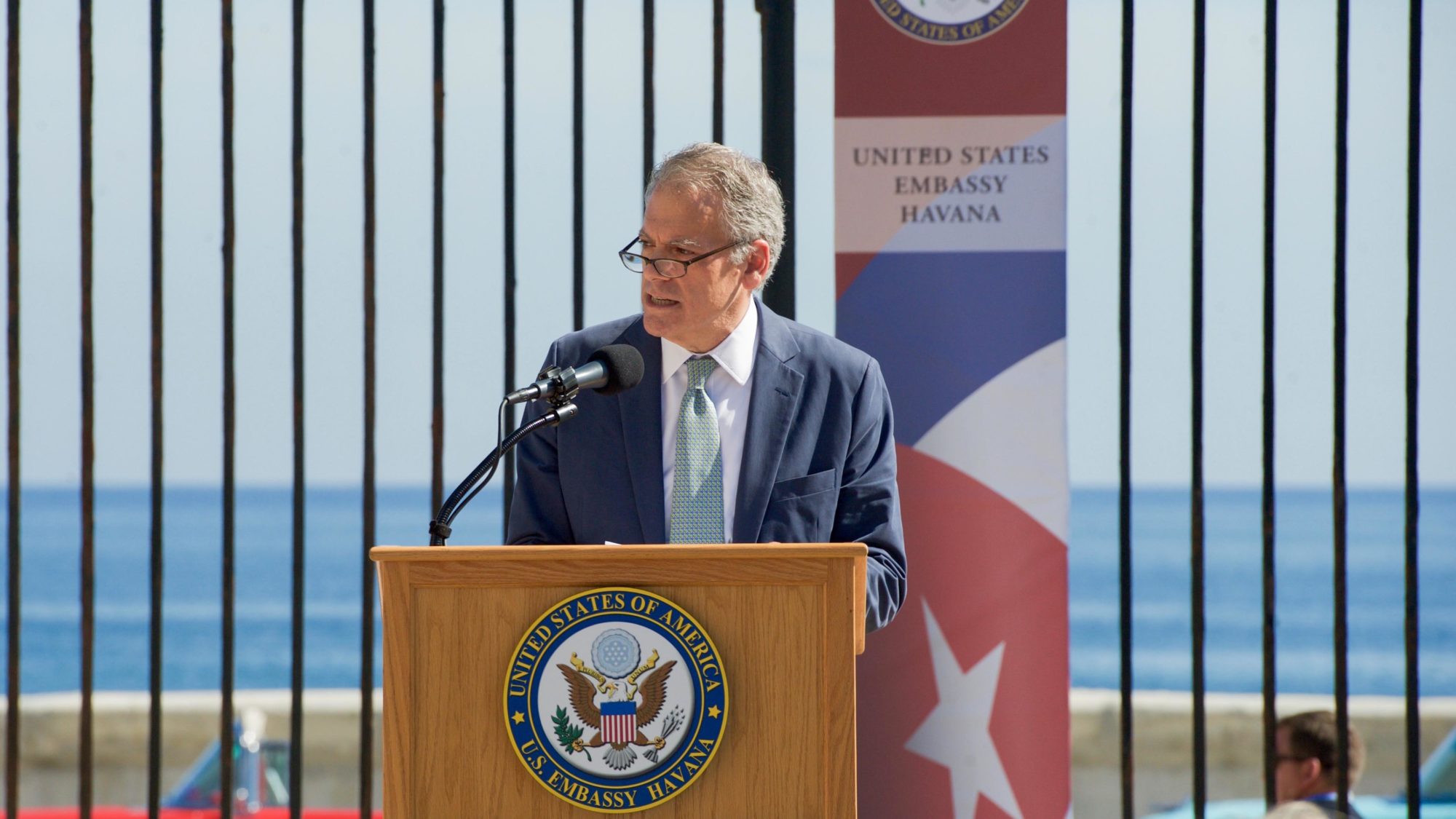
Title: Amb. Jeffrey DeLaurentis on the U.S.-Cuba Relationship
On April 5th, Ambassador Jeffrey DeLaurentis gave the keynote speech for the Walsh Exchange, an undergraduate research conference centered on international relations hosted by Georgetown University’s School of Foreign Service. Ambassador DeLaurentis shared his experiences working to normalize US-Cuba relations after his appointment to the U.S. Embassy in Havana under the Obama Administration. Following the event, GJIA sat down with Ambassador DeLaurentis to hear his insights into the practice of diplomacy and how the US-Cuba relationship is continuing to change.
GJIA: The US and Cuba have historically had a difficult relationship. How did re-establishing diplomatic relations with Cuba under the Obama administration change that relationship, and how effective was this change?
JD: The decision to change the relationship came in part from President Obama himself, who made it very clear at the beginning of his administration that it was often in the best interest of the United States to engage with adversaries rather than to try and isolate them, though of course each case is different. He made a number of initiatives to try and launch this change. He felt that Cuba was changing—certainly on the economic front—and that it would be better to have an impact on those changes. It was quite a long process. Negotiations began in May or June of 2015, and culminated in this simultaneous announcement by both presidents on December 17, 2014, at which point we got to work trying to negotiate the reestablishment of diplomatic relations. Then, during the rest of the administration, we worked hard to complete 23 agreements, and we launched 17 dialogues on a variety of issues. Most of those were issues that two countries 90 miles apart want to be cooperating on as a matter of course, but we also began dialogues on some very difficult and challenging issues, such as human rights, particularly civil and political rights, and the properties that were expropriated from American citizens by the revolutionary government. I believe that it was in the best interest of the United States to pursue this kind of relationship; it doesn’t mean we agreed on everything, but it was the best way to promote the values that we hold dear.
The current administration has very different policies and attitudes towards Cuba, preferring more isolation and pressure than negotiation. What do you foresee as the short- and long-term effects of this change in policy?
It’s pretty clear, given my previous role in Cuba, that I don’t believe the new policy will be effective. If anything, it could delay other changes in Cuba that might have materialized. I think it gives greater ammunition and sway not to change anything to those on the island who were already opposed to the normalization.
You mentioned that secret talks under the Obama administration were crucial in changing our relationship with Cuba. In both practice and principle, what are the advantages and disadvantages to using secrecy as a foreign policy tool? Are there any moral implications of keeping these issues secret?
I think it depends on the circumstance. Oftentimes, it’s useful; other times, it’s really not. Certainly, in terms of US-Cuban relations over many decades, it’s often been a tool used on the migration accords from 1994-95. It was useful to begin negotiations that way, given the circumstances and the many different views on the utility of having discussions. Diplomacy has been conducted both quietly and loudly; it really depends upon the circumstances and what both sides agree would achieve the results that everyone is looking for.
People generally seem to agree that reform in Cuba is good, but where they disagree is how to achieve that reform. In your opinion, is there a politically viable way to encourage reform in Cuba, and what would that look like?
Having the sort of relationship that we were building in the last administration would have a greater effect on encouraging reform simply because we were trying to encourage greater people-to-people contact. We were trying to encourage greater communication both within the island and off the island, and we were certainly trying to encourage the burgeoning private sector, as many of their clients-and the visitors coming in-were Americans. My sense is that that is a more appropriate way to encourage reform, such as more exposure to the outside and so forth, but obviously many people disagree with that approach.
Disclaimer: This transcript has been lightly edited for clarity and length.
. . .
Ambassador Jeffrey DeLaurentis, a 27-year veteran of the Foreign Service, is a Distinguished Resident Fellow in Latin American Studies in the Institute for the Study of Diplomacy and a SFS Centennial Fellow. He served as the first Chargé d’Affaires at the U.S. Embassy in Havana following the re-establishment of diplomatic relations between the United States and Cuba. Prior to taking up his Cuba post in August 2014, he was the Alternate Representative for Special Political Affairs at the U.S. Mission to the United Nations. He also previously served as Deputy Assistant Secretary of State for the Bureau of Western Hemisphere Affairs, and as Minister Counselor for Political Affairs and Security Council Coordinator at the U.S. Mission to the United Nations. Ambassador DeLaurentis began his State Department career in 1991 as a consular officer in Havana, and returned to Cuba as Political-Economic Section Chief in 1999-2002. In Washington, he served as Executive Assistant to the Under Secretary of State for Democracy and Global Affairs, Special Assistant to the Assistant Secretary of State for Western Hemisphere Affairs, and Director of Inter-American Affairs at the National Security Council. He is a graduate of the Georgetown University School of Foreign Service and Columbia University Graduate School of International and Public Affairs.